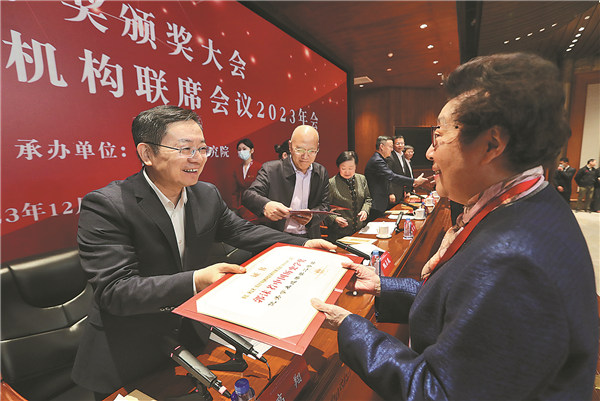

A total of 41 books and 20 journals of historical studies have been awarded at the ceremony of the Guo Moruo Chinese History Awards, which was held in Beijing on Dec 20.
Award winners included books of general history, dynastic history, archaeology, paleography and paleoanthropology. For example, Study on the Form of Ancient Chinese Villages makes a systematic analysis of the birth, form and evolutionary traits of ancient villages in China, providing insights into the relationship between villages and the ruling dynasties, as well as the power structure within the villages themselves.
The book was written by Ma Xin, a professor at the Shandong University's School of History and Culture, who mainly studies village society during the Qin (221-206 BC) and Han (206 BC-AD 220) dynasties.
"In academic research, we must make clear the relationship between the whole and the parts. Without an understanding of the overall development of village society, we cannot thoroughly understand the Qin and Han village societies," says Ma, explaining why she wrote the book.
Other award winners include History of Social Life in the Early 20th Century, a book about the many facets of people's lives, like diet, clothes, festival celebrations and entertainment in early 20th-century China, and Organization and Study on Ancient Bronze Vessels in China, a collection covering the development of various types of bronze vessels from Erlitou Culture, which existed from the 18th to 16th century BC to the late period of the Warring States Period (475-221 BC).
Three books that popularize history knowledge to the public were honored as well, including Uninterrupted History of Civilization: Archaeological Interpretation of Five Thousand Years of Chinese National Identity, written by Liu Qingzhu, a researcher with the Institute of Archaeology, Chinese Academy of Social Sciences.
According to Liu, China is the only nation with an uninterrupted civilizational history of 5,000 years. The dynasties established by different people in various times have a shared national identity.
That can be shown in layouts of capitals from the Erlitou site in Luoyang, Henan province, widely believed to be the capital of the late period of the Xia Dynasty (c. 21st century-16th century BC), to the Palace Museum in Beijing, China's imperial palace from 1420 to 1911; and in tomb systems from those at Yinxu Ruins in Anyang, Henan, capital of the late Shang Dynasty (c. 16th century-11th century BC) to the ones of the Qing Dynasty (1644-1911), as he demonstrates in his book.
According to Gao Xiang, president of the CASS, the award-winning works are intellectually profound, academically cutting-edge, reflecting the rigorous and practical academic character of historians, each of whom dare to innovate, are willing to take responsibility, and relentlessly pursue the truth.
They fully demonstrate the new progress, achievements and atmosphere of Chinese historical studies in the new era, he adds.
Named in honor of Guo Moruo (1892-1978), a Chinese historian and writer, the award was initiated in 1998 to promote the development of the nation's history studies. It is regarded as one of the most authoritative prizes in domestic history circles.